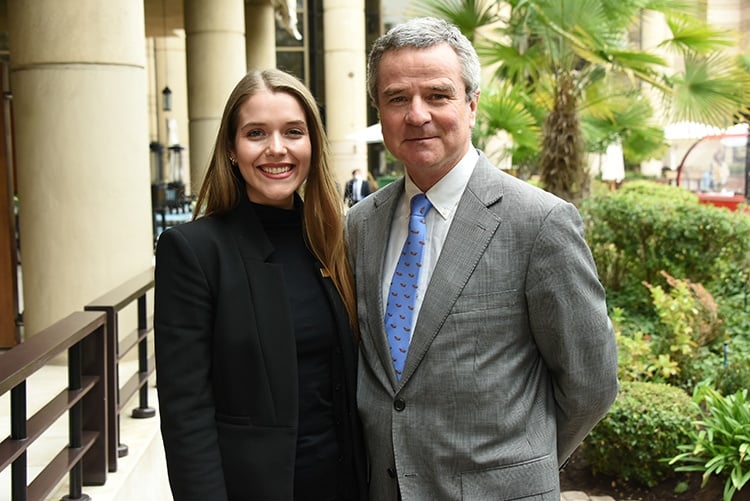Event Report
After the postponements caused by the pandemic, the inaugural Legal 500 GC Summit Chile was finally held at the Mandarin Oriental, Santiago’ Foyer Aysen on Thursday 1 September 2022. The looming prospect of the country’s constitutional plebiscite did nothing to dampen spirits as we welcomed 100 GCs to the event – strictly in accordance with Covid-19 regulation protocols that remain in effect in the country. Enthusiasm was high for a series of four panel discussions on critical matters currently affecting business operations in the country.
With a busy agenda, after a light lunch and a brief introductory address and words-of-welcome from Tim Girven, The Legal 500’s senior editor for the Western hemisphere, the event moved straight on to our first panel, which focused on the ever sensitive issue of tax and the pending tax reform to be introduced by the Boric administration. Chaired by Alex Fischer (founding partner of Fischer & Cía), the panel brought together Macarena García (senior economist at the free market think-tank, ‘Libertad y Desarrollo’, who has been a professor at the Economics Institute of the Pontificia Universidad de Chile of over 20 years); and Diego Riquelme (the current administration’s coordinator of Fiscal Policy at the Ministry of Finance) to discuss -as far as possible, given that the final text of the proposed reform has not yet been published- various aspects of the proposed reform – notably the reformulation of income tax, and the modification of both rules concerning both tax exemption and tax avoidance. Given his schedule, Sr Riquelme’s contribution was reduced to a 20 minute response to various questions by moderator Alex Fischer – but that proved more than enough material for Ms García to subsequently highlight some of the implicit risks and variables as to the approach taken by the administration… not least to highlight that the projected collection under such new norms did not begin to meet the governments stated expenditure plans. The audience was also keen to hear her thoughts on the application of corrective taxes as part of the reform, and whether she regarded this instrument as a useful tool; while also seeking Alex’s opinion on the likelihood and nature of a digital services tax (in addition to the reform of VAT on services), as well as his take on the reform of income tax.
Our second panel, organised by Baker Mckenzie Chile, focused on the protection of foreign investment in Chile – in particular via bilateral investment treaties. Arguably it was this panel that felt the weight of the imminent constitutional plebiscite most distinctly, in so far as the text delivered by the Constitutional Assembly undoubtedly increased the vulnerability of investments in the country, with its radical redrawing of the limits of juridical security in areas such as mining, the knock on effects of the reclassification of water resources, etc. Indeed, fittingly, the panel brought together not only the firm’s mining partner, Mirco Hilgers and his colleague -the office’s head of both competition and dispute resolution- Rodrigo Díaz de Valdés- but also mining-giant Anglo American’s head of legal, Alicia Undurraga; and Alejandro Rubilar – a well-known figure in the region’s in-house corporate community – who is an executive director, general counsel for Chile, and regional head of corporate legal matters at JP Morgan Chase. Rodrigo proceeded to give a detailed breakdown of the current panorama, noting the decline in investment conditions in Chile, the growth of regulatory intervention by the State in certain sectors and the parallel growth in the number of ICSID cases facing the Chilean state. He then moved on to a review of the various pro-investment instruments – including TLCs, ACEs, APPIs, multilateral agreements and the Washington Convention; the definition of “an investor” and their rights (fair & equitable treatment; security and protection; profit repatriation; expropriations; and umbrella clauses etc); and finally a breakdown of the dispute resolution process (amicable consultation phase; the stages of arbitration – UNCITRAL, PCA and ICSID/CIADI) and case projection. Much of the subsequent discussion focused on major/long term project investment (such as that necessary in the mining sector) and the increased risks enshrined in the draft constitution. The conversation subsequently digressed onto issues of ‘green financing’; and also the remedies available to foreign financed local investors in the face of the acceleration of foreign financings due to legislative changes.
After a brief coffee break, our attendees reconvened for the third panel which focused squarely upon the issue of current constitutional and regulatory changes in the country, the associated risks for business and the remedies available. Chaired by Bofill Escobar & Silva’s Vanessa Facuse -whose practice centres on competition, the regulated markets, construction, concessions and public law, the panel also included The Adecco Group’s legal director, Felipe Leigh; CAPSA’s head of legal and sustainability, Stefan Franken Osorio; and the vice president of innovation and legal director at Microsystems, Victoria Hurtado. The animated discussion saw multiple points raised across a whole range of topics, with Felipe noting Adecco’s experiences in an international context (especially with regard to Mexico, where the recent labour reform curtailing labour outsourcing for core business activities closely mirrored by Chile’s new prospective labour legislation); Stefan noted the pressing need for regulation in many of the market segments in which it is being proposed – and the need for companies and corporates to “get on board” – particularly given the increasing immediacy of the global climate crisis; and Victoria raised issues around the lag between innovation and regulation. Unsurprisingly, all agreed that there was no argument with regulation per se, but that the critical issue was the quality of the regulations imposed and the degree to which these could be considered as, firstly, pro business; and secondly, as establishing a genuinely “level playing field” for all market players – including the state (as and where relevant). As could also be expected, the panel sparked multiple questions, ranging from what the role of the Central Bank should be vis-a-vis price controls and the extent to which it should coordinate its actions to/with the policies of the government; to whether -from a regulatory perspective – it is better to have a state that invests in innovation or a market where this is left to private companies and then the state “catches up”?
Our final panel concerned the current reforms to regulations regarding personal data and whether – in simple terms – this constitutes a challenge or an opportunity for companies and corporations. The panel was chaired by Magliona Abogados’ TMT, IP and data-privacy partner, Nicolas Yuraszeck, who began with a detailed breakdown of the current status quo regarding personal data in Chile and the nature of the project in hand: the creation of a Personal Data Protection Agency; the principles underlying the way data will be treated (purposes, ends, proportionality, responsibility, security, transparency and confidentiality, etc.); the rights of portability and opposition; the obligations of those handling data; the sanctioning regime (attenuating and aggravating factors, the calculation of fines, etc.); issues surround international transfer; infraction prevention models; and finally the coming into effect of the project, the challenges faced, and its constitutional basis (article 376). Nicolás then opened the discussion to a top flight panel comprising: Margaret Hirsch – Legal and compliance director at Adidas Chile; Dafne González – head of operational legal affairs at Falabella; Anastassia Fagetti Arenas – head of legal and data protection officer for Chile and Peru at L’Oréal; and Nicolás Schubert – Government Affairs and public policy manager at Google Chile. The breadth of experience and expertise (especially from an international angle and stemming from experiences with GDPR), permitted an efficient and precise assessment of the project as it currently stands, and of potential points of friction, with all those taking part concluding that the project is not only a necessity (indeed, arguably the move is long overdue) but also very much an opportunity for those corporates who choose to meet it proactively.
A deeply informative and stimulating afternoon was brought to a close with drinks and canapes in the adjoining Salon where a glass of Chilean merlot, animated discussion and ceviche were very much the order of the day. With a sizeable female contingent present, the event even saw the impromptu formation of a Chilean Women GC’s WhatsApp group. Suffice to say that the general consensus -the looming plebiscite notwithstanding- was one of positivity and optimism. We look forward to organising the 2023 Summit, but for now, our thanks to both our sponsor firms: Fischer y Cía, Baker McKenzie Chile, Bofill Escobar Silva Abogados and Magliona Abogados, along with app sponsor, LemonTech; and of course to all those that attended and whose presence made the event the great success it was.





